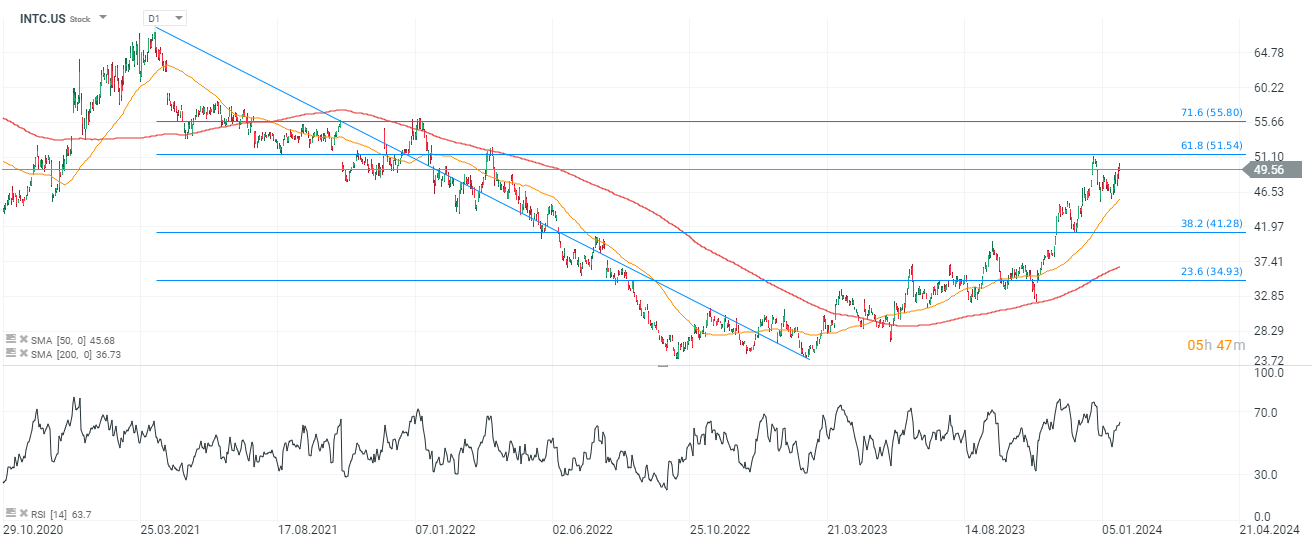Technology giant Intel (INTC.US) will report Q4 2023 results, today, after the Wall Street session. The industry expects that processor sales may be past their cyclical low, and considerable optimism around AI means that the results could be positively received by the market. Of course, if Intel manages to gain at least some market share in a growing AI market. The company has long been trying to rebuild its position as a global chipmaker, after losing market share to TSMC (TSM.US) and AMD (AMD.US). Will the results challenge the status quo and the enthusiasm of technology investors enough; will the company provide more optimistic forecasts for the rest of the year?
Revenues: $15.2 billion vs. $14 billion in Q4 2022
Earnings per share (EPS): $0.44 vs. $0.10 in Q4 2022
Analysts will want to know if Intel has a chance to regain a sizable share of the market for chips used in servers, and if it will be able to provide accurate guidance, for 2024, along with the capabilities of new 'AI computers'. Some forecasts assume that the cyclical recovery of semiconductors, will support the company in 2024, at a time when PC inventories are falling. However, Wolf Research analysts expect fundamental factors to weigh against Intel, which is facing lower cash flow, declining margins and share in a rapidly evolving market. Analysts has become somewhat more optimistic about contract services for chip manufacturing, so-called 'foundries'. These are expected to bring Intel about $343 million in revenue in the new quarter, compared to less than $180 million in Q4 2022. The company's CEO, Gelsinger in December indicated that the company was finalizing a deal with a third-party customer (out of two so far).
Core Ultra gives a hope?
- Intel is trying to promote its own AI in the wave of Core Ultra chips, for PCs (debuting in December 2023). W. Intel will allow them to run AI applications, directly on laptops and desktops, and improve sales performance in 2024.
- Also due to 'cyclicality' - the company estimates that consumers and corporate customers who bought new laptops and desktops at the start of the pandemic will slowly start looking for more powerful replacement devices. Wall Street, too, has reason to believe that the computer market will gradually emerge from its seasonal slump in 2024. Revenue from the computer segment is expected to reach $8.4 billion, compared to $6.6 billion in Q4 2022.
- Core Ultra includes a so-called NPU, which allows computers to run some AI applications without the required access to the cloud (no online status required). According to analysts, this may be of interest to companies and those seeking greater privacy.
- It is still unclear how useful embedded AI will be for consumers, as Intel itself is unsure what it will offer beyond a GPT-like chatbot or image editing tools. Against this backdrop, we can expect that any announcement indicating that Intel will not be an AI 'marauder' could bring quite a positive surprise.
Data centers and AI
Wall Street will pay considerable attention to Intel's data center and AI revenues. These are expected to be around $4.1 billion in Q4 2023, compared to $4.4 billion in Q4 2022. Here Wall Street can be seen to be quite skeptical, and it seems that this is the segment that will electrify investors the most, especially after CEO Pat Galsinger suggested that the AI & Data Centers business is Intel's chance to beat rivals Nvidia and AMD. In December, the company unveiled Gaudi3, an AI gas pedal dedicated to software AI, with a particular focus on generative AI. On Wednesday, Intel announced the opening of its newest chip manufacturing facility in New Mexico.
Intel shares (INTC.US)

Source: xStation5

Daily summary: Silver plunges 9% 🚨Indices, crypto and precious metals under pressure

Does the current sell-off signal the end of quantum companies?

Howmet Aerospace surges 10% after earnings reaching $100 bilion market cap 📈

US Open: Cisco Systems slides 10% after earnings 📉 Mixed sentiments on Wall Street
The content of this report has been created by XTB S.A., with its registered office in Warsaw, at Prosta 67, 00-838 Warsaw, Poland, (KRS number 0000217580) and supervised by Polish Supervision Authority ( No. DDM-M-4021-57-1/2005). This material is a marketing communication within the meaning of Art. 24 (3) of Directive 2014/65/EU of the European Parliament and of the Council of 15 May 2014 on markets in financial instruments and amending Directive 2002/92/EC and Directive 2011/61/EU (MiFID II). Marketing communication is not an investment recommendation or information recommending or suggesting an investment strategy within the meaning of Regulation (EU) No 596/2014 of the European Parliament and of the Council of 16 April 2014 on market abuse (market abuse regulation) and repealing Directive 2003/6/EC of the European Parliament and of the Council and Commission Directives 2003/124/EC, 2003/125/EC and 2004/72/EC and Commission Delegated Regulation (EU) 2016/958 of 9 March 2016 supplementing Regulation (EU) No 596/2014 of the European Parliament and of the Council with regard to regulatory technical standards for the technical arrangements for objective presentation of investment recommendations or other information recommending or suggesting an investment strategy and for disclosure of particular interests or indications of conflicts of interest or any other advice, including in the area of investment advisory, within the meaning of the Trading in Financial Instruments Act of 29 July 2005 (i.e. Journal of Laws 2019, item 875, as amended). The marketing communication is prepared with the highest diligence, objectivity, presents the facts known to the author on the date of preparation and is devoid of any evaluation elements. The marketing communication is prepared without considering the client’s needs, his individual financial situation and does not present any investment strategy in any way. The marketing communication does not constitute an offer of sale, offering, subscription, invitation to purchase, advertisement or promotion of any financial instruments. XTB S.A. is not liable for any client’s actions or omissions, in particular for the acquisition or disposal of financial instruments, undertaken on the basis of the information contained in this marketing communication. In the event that the marketing communication contains any information about any results regarding the financial instruments indicated therein, these do not constitute any guarantee or forecast regarding the future results.


